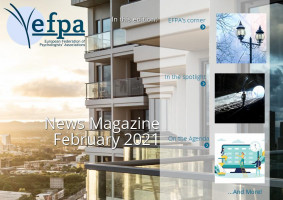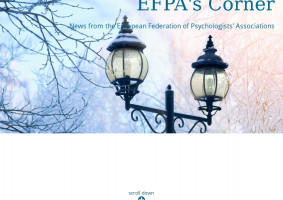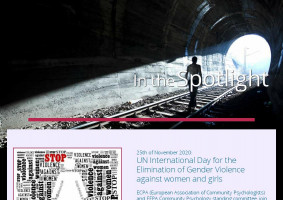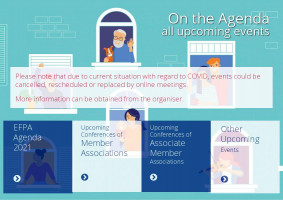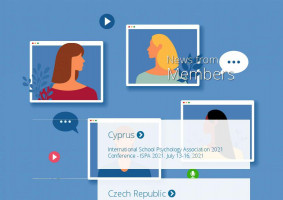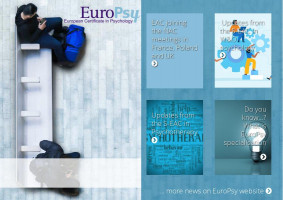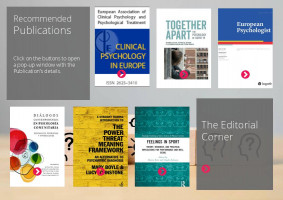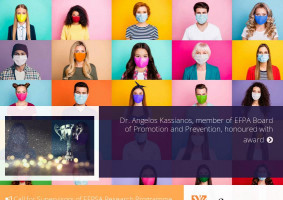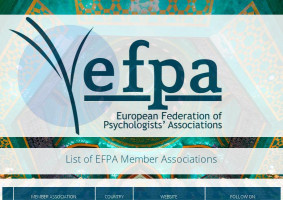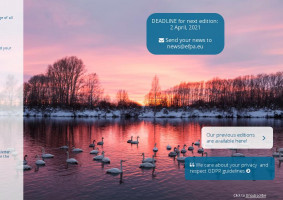What is EuroPsy?
Click here to
learn more
EuroPsy (or European Certificate in Psychology)
is a European standard of education, professional training and competence in psychology set by the European Federation of Psychologists’ Associations (EFPA).
Visit: www.europsy.eu

EAC joining the NAC meetings in France, Poland and UK
The pandemic over the past year has prompted many of us to arrange online meetings and create opportunities to connect with our colleagues. No more worrying about flight and accommodation costs, and travel time. I had the pleasure of attending 2 National Awarding Committee (NAC) meetings since our Chairs meeting in September.

In September I joined Anne Plantade and our French colleagues at their NAC meeting. The membership of the NAC represents a range of academics and practitioners from school psychology, organisational psychology, clinical and health psychology. Colleagues who have attended the annual NAC chairs meeting will be aware of the initiative in France for training supervisors. To date they have trained 40 groups of 4-7 psychologists through a supervision module (80 hours) and certificates are awarded at a ceremony in Montpelier. While there is a good demand for this training, the group highlighted the need to inform employers about the EuroPsy and explore ways of encouraging employers to provide financial support for supervision.
They are also interested in raising awareness among bachelor level students. School psychology has developed in France in recent years where the Association of School Psychologists has used the EuroPsy model to develop supervised practice for one year following education. Psychology in France is regulated through the Department of Education and Higher Education.
There are currently discussions, facilitated by a formal group established by the Ministry two years ago, about increasing the duration of training for psychologists in France. The EuroPsy model was presented to this group, which is working on identifying required competencies for psychologists. The NAC is interested in influencing this process to incorporate more supervised practice as part of the training pathway. There are difficulties in obtaining internships and placements; this will become even more challenging if the training period is extended.
In October I was invited to join Beata Rynkiewicz and the Polish NAC. They meet once a month and have a pretty full agenda to get through. There is a good representation on the committee from both academic and practice settings, representing developmental psychology, clinical psychology, sports and performance psychology, neuroscience, educational psychology and counselling psychology. As discussed at our Chairs meeting in September, the Polish NAC has introduced the idea of a 'certificate of consistency' for Universities who provide education programmes that are aligned with the EuroPsy education standards. This has created extra work for the NAC and at this meeting Adam Tarnowski demonstrated for me their process of evaluating the curriculum of an education programme. If the university programme is deemed to meet the EuroPsy standards, the University is issued a 'certificate of consistency' and can use this in their promotion materials when advertising their programmes. The Polish NAC is very enthusiastic about this development and they have a number of universities interested in availing of this certificate. It is important to note that this is not an accreditation process - that would be a more comprehensive evaluation, requiring considerable resources. However, it has potential to raise awareness of the EuroPsy as a brand of quality assurance, meeting a key objective of the EuroPsy certification process since its inception.
I'd like to thank both the French and Polish NAC for welcoming me to their meetings and sharing detailed information about their ongoing work in implementing the EuroPsy. Listening to their deliberations reminds me of the time and dedication that so many psychologists across Europe commit to the EuroPsy project in promoting the profession of psychology and making this a better world for all

The two-hour meeting with the UK NAC on the morning of February the 4th was very productive. Garry Squires, Helen Baron, Bridget Hanna, Gary McPherson and Phil Donnison opened the zoom meeting to Rachel Scudamore, Natalie Billing and Laura Devlin, responsible for important missions in the British Psychological Society.
I was also present as EAC’s NAC UK liaison. The most important message that was passed is that this NAC embraces the EuroPsy cause and devotes a lot of time to reviewing standards, competencies and CPD in accordance to EuroPsy principles. All debates were action oriented. The two most relevant issues discussed were the Membership Survey for EuroPsy by BPS the development of the Specialist Certificate in Work & Organisational Psychology and the UK SNAC. Both intend to in order to promote and develop Europsy.
The experience for NAC as well as EAC is stimulating and thought-provoking and should be taken as an example for all NACs. I'd like to thank the NAC UK for welcoming me to their meeting and sharing detailed information about their ongoing work in implementing the EuroPsy.)
Updates from the S-EAC in W&O psychology

The SEAC Work and Organizational met on 19th January to discuss developments and updates to specialist certificate.Reports of activities were discussed in Spain, Norway and Finland where specialist national awarding committees have been established.
The group discussed steps for the coming year, and will be proactively making contact with EuroPsy national awarding committees who may be interested to explore introduction of the specialist certificate in work and organizational psychology.
Application and exploratory discussions with any country seeking to introduce the specialisation are very much welcomed and encouraged.
Updates from the S-EAC in Psychotherapy
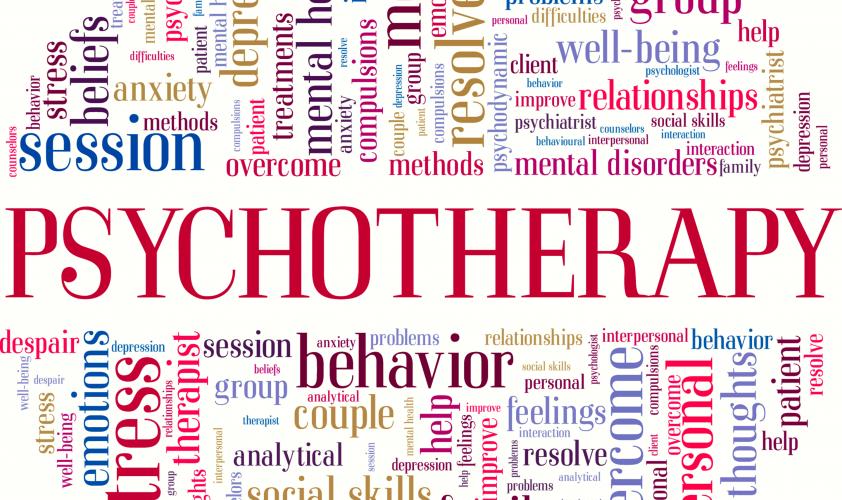
The S-EAC in Pt overseeing the EuroPsy Specialist Certificate for Psychologists specialised in Psychotherapy is working on the concrete conceptual framework underlying the EuroPsy Specialist Certificate within the context of the 2017 EFPA declaration on Psychotherapy. Our EuroPsy specialist certificate for Psychologists specialised in Psychotherapy is considered to be an important instrument for Member associations to document and affirm the specialised competences in Psychotherapy of their members. The nature of the specialised activities will be described as well as their specialised competences and the specialisation training they accomplished.
This clinically and scientifically underpinned conceptual framework can be useful for various stakeholders such as potential patients and clients looking for correct information on the type of mental health interventions including psychotherapy they could benefit from. It can be interesting for the professional psychologist making his career choices and planning his postgraduate training. Institutes offering specialization training to psychologists who want to offer this type of specialized psychological service can take the framework into account in the development of their training programs. The information can also be useful for insurance agencies in need for explicit criteria for the selection of professionals whose services will be included in the insurance plan. And last but not least, governments and policy makers responsible for the organization of health care in general and mental health care in particular can make use of this framework to integrate this important type of psychological services delivered by specialized psychologists in their policy decisions.
Do you know...?
What is EuroPsy specialisation
_w936_h988_1.jpg)
The EuroPsy Specialised Certificate is an additional qualification and builds on the standard of the EuroPsy.
It is therefore only awarded to psychologists who hold the EuroPsy. After a number of years of practice as a psychologist, it is possible to apply for a Specialist EuroPsy Certificate.
At the present time this exists in two areas:
- Psychotherapy
- Work and Organizational Psychology.
